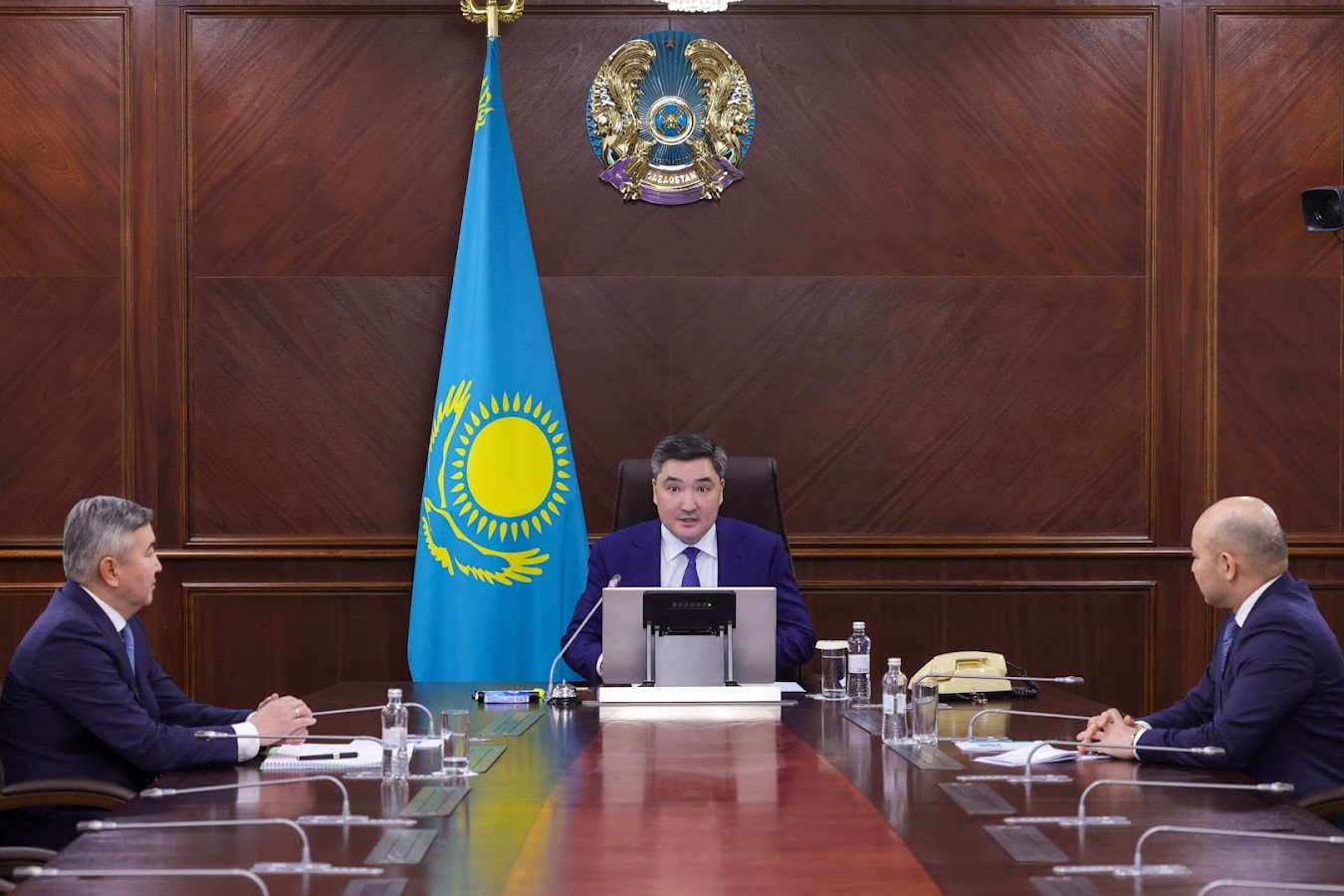
Kazakhstan’s new PM Olzhas Bektenov addresses a meeting of government officials. Source: PM's office
Early last week, the cabinet headed by the former Kazakhstani PM Alikhan Smailov officially resigned, resulting into the establishment of a new government, albeit largely made up of ministers from the previous cabinet. One new appointee, however, the new Prime Minister Olzhas Bektenov, worked previously as the head of the presidential administration – a non-cabinet position (Sputnik Kazakhstan). With a background in Anticorruption, the new PM announced a package of reforms across all sectors of government, including an audit of the national budget, industrial development the construction of seven hundred megawatts of power generation, and social reforms in digitization, healthcare, and insurance (Astana Times). Likewise, the new minister has placed importance on the development of artificial intelligence, cutting red tape out of the country’s bureaucracy and “ensuring the rule of law for the country’s benefit” (Astana Times).
KAZAID, which was established in 2020 to provide official development assistance to developing countries, mainly in the Central Asian region, has announced a new series of cooperative projects for 2024 and into the following year. This includes developing cooperative and capacity-building partnerships with other development organizations, such as USAID and OECD, to strengthen the quality of Central Asia’s only official development assistance organization (Astana Times). The organization also presented a new plan, called the Dostyk program to modernize and develop the region’s civil service apparatuses through the adoption and development of e-governance programs. The Avicenna health program, to develop the region’s healthcare, was also announced (Astana Times).
Elsewhere, a two-day international conference on drilling cooperation was held in Baku this week to discuss the potentials of the hydrocarbon reserves in the Caspian Sea. The event was attended by representatives from the Caspian Sea states as well as representatives from the oil and gas MNCs such as TotalEnergies and Turan Drilling and Engineering, among others (Kazinform). In between the talks about expanding the Caspian’s drilling capacity which reached 63.5 million tons of oil in 2023 (Astana Times), Kazakhstan announced the creation of a research institute to measure the erosion of the sea and the impact of resource extraction projects on the quality of the sea’s water and ecosystems. This organization would include partnerships with other regional governments to address water quality and ecological issues facing the Caspian and the wider region (Astana Times).
Elsewhere at a bilateral meeting in Tashkent, Uzbekistan, Presidents Mirziyoyev and Lukashenko, announced that their two states would enhance their relations and partnerships in trade and international organizations. The flagship agreement of this meeting included a one billion dollar increase in trade turnover target and a cooperation agreement to develop infrastructure and trade corridors to ensure that this target could be met (Gazeta Uzbekistan). The leaders further discussed cooperation within the framework of international organizations, such as the United Nations, CIS and EAEU, and through the enhancement of people-to-people partnerships, tourism, and other forms of exchange. Further agreements on consumer protection, energy cooperation, education as well as culture were also signed (Uzbekistan MFA).
Further down south, Afghanistan’s Nangarhar University, cooperating with the Taliban government’s Ministry of Higher Education held an international conference on climate change in Jalalabad. In particular, the conference focused on research conducted by academics in Afghanistan to analyze the impacts of climate change in Afghanistan. The conference was attended by government ministers in the agricultural and economic ministries and academics from Afghanistan and the South Asian region (Bakhtar News). A major theme of the conference was the impact of decades of conflict on the environment of Afghanistan, which resulted in the degradation of the country’s soil and deforestation. Likewise, the country’s efforts to develop have resulted in academics across the country calling for sustainable efforts to be made to maintain Afghanistan’s environment and set out protected land that will be free of development (Tolo News). At the conference, two hundred fifty articles were published from researchers in and out of the country (Pahjwok News).

